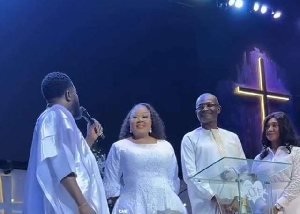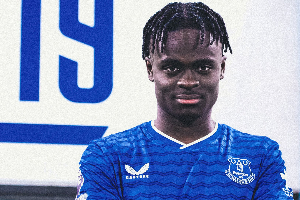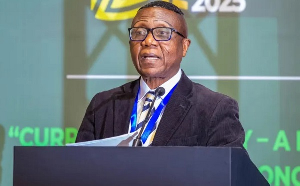I cannot recall the first time I heard the phrase: “Fathia Fata Nkrumah.” But those words have been emblazoned in my mind’s optic for some years. One thing I am certain of is, the more I heard the statement, the more I began to question the motive behind it. For those who are not well-versed in the Twi language, please allow me to translate. The literal meaning of the phrase is: Fathia is befitting or deserving of Ghana’s first president, Osaagyefo Kwame Nkrumah. From what I understand, when Dr. Nkrumah married the late Madam Fathia, to commemorate their union, the market women of Osaagyefo’s era named a Cloth after the couple. And the name of the Cloth was “Fathia Fata Nkrumah.”
No disrespect to Madam Fathia, but had Dr. Nkrumah married an “Ebony Goddess” of Ghanaian descent, would such a phrase have been coined? Had Madam Fathia been a “Black Princess,” would she have been accorded such prestige? What made Madam Fathia so unique that it had to be declared, or immortalized, that she was befitting of Ghana’s first president? Was it due, perhaps, to Madam Fathia’s pinkish hue and foreign origins?
About a year ago, we had a soirée for one of my Aunts on her 50th birthday in the Tri-State area. After the party had ended, some of us family members sat in my Aunt’s living room and made small conversations. My Aunt said to me that the woman we usually bought our “Ntema” from had imported “the latest” Vlisco Super Wax; as such, we should visit the importer before I return to Washington. I said to my Aunt thusly: “Auntie, you know I buy my “Ntema” on the basis of its name. Did the lady tell you which ones she had?” “Daabi, wose yenbra me hwe,” my Aunt answered. This led to a light-hearted conversation about the names we Ghanaian women give to our “Ntema.”
As my Aunts enumerated names and meanings, I asked them why they thought that the market women of Dr. Nkrumah’s era chose the name “Fathia Fata Nkrumah.” “Oh, na Fathia ho ye fe, ne ahoofe ntira,” one of my Aunts responded. It cannot be denied that the late Madam Fathia was stunning! But I do not believe her beauty was the sole reason for the phrase. I then asked: “Do you think that such a name would’ve been given to the 'Ntema,' had Dr. Nkrumah’s wife been a gorgeous Ghanaian woman?” Some said yes – others said no.
A debate ensued, and my Aunts shared stories they had been told about Osaagyefo when they were little girls. Some asserted that Osaagyefo was to wed a Ghanaian woman prior to meeting Madam Fathia. I cannot verify the validity of my Aunts’ claim, as I have not been able to locate concrete evidence to support it. In the final analysis, the consensus was that had Dr. Nkrumah’s wife been a Ghanaian woman named, say, Ama Serwaa, such a phrase would never have been created. And I must say, I share my Aunts’ convictions!
Most Ghanaians will admit that inferiority complex syndrome permeates our culture. This illness has led some of my fellow Ghanaian ladies to modify their stunning ebony skin tone with very harsh chemicals. These women are causing irreversible damage to their perfectly beautiful skins; it is mind boggling how oblivious some of them are to the negative effects of such alterations. Conversely, as a result of inferiority complex disease, some men of Ghanaian descent have developed a penchant for making blanket and ignorant comments about their female counterparts. I am, of course, speaking of Ghanaian men who tend to date women whose ancestry did not originate from Ghana.
There are two types of Ghanaian men who date foreign women (let’s label them Type A and Type B). Now, I am not claiming that we have done a scientific research on the matter – far from that! We based our conclusions on interactions and/or conversations with people who are Type A and Type B, as well as other individuals. When a Type A guy is asked why he is dating a foreign lady, his answer is usually: “I like all women, I just happened to have fallen in love with a girl who is not a Ghanaian.” I think this is a fair and honest answer! And I cannot see why anyone would begrudge Mr. Type A for his answer. After all, we live in a global village.
Mr. Type B, on the other hand, has always been enamored with everything foreign! So he must achieve his lifelong dream of bedding a foreign woman. These are the males who are prone to generalizing Ghanaian women with ignorant statements. When a Type B guy is asked why he does not date Ghanaian women, he responds thusly: “Ghanaian women are too this, they are too that, and so on and so forth.” In fact, he cannot think of one positive thing to say about Ghanaian women. The inferiority complex illness has compromised his senses! The more one converses with a Type B man, the more it becomes apparent that, in his view, Ghanaian women are inferior to his woman, by virtue of the latter’s origin. One cannot help but wonder what Type B thinks of the Ghanaian woman that gave him life!
I have, in the past, dated a non-Ghanaian guy, and never did I feel a need to elevate him above Ghanaian men. Sometime ago, an article appeared on this website about interracial dating. One male remarked that he dates Western women because Ghanaian women have, in his words, “African bedroom skills.” But were “African bedroom skills” not utilized to conceive this boy? If the boy were not stricken with inferiority complex illness, would he preface such a statement with the word “African”? It is obvious that to him, Africa(n) is synonymous with inferior. The boy further equated Ghanaian women to bicycles; foreign women to luxury vehicles. He clearly exemplified a victim of inferiority complex!
Another romance article appeared in this forum last month. One male commented that, when a typical Ghanaian woman is asked to dress sexy for an outing, she puts on “Kaba and Slit” – he implied that “Kaba and Slits” were not sexy. Au contraire! Imagine, if you will, that a lady wears a “Kaba” that hugs her body ever so snugly. The accompanying “Slit” has a split that starts from her ankle and ends at her knee – or higher up the leg (lol). The lady then adds a pair of 4- or 5-inch stilettos to her outfit. As she struts into a gathering, I ask you, what hot-blooded man would not find her ensemble sexy? Any man with blood running through his veins will be entranced by the woman’s attire! Unless, of course, said man is blinded by inferiority complex, and, as such, cannot see appeal in Ghanaian wear.
The point I am trying to make here is that inferiority complex syndrome affects all facets of Ghanaian life, and until something is done to remedy it, we shall remain stagnant. It is my contention that the disease is partly responsible for retarding our nation’s progress –and, by extension, our standing in the world. In the presence of foreign dignitaries, our leaders behave as if they are “giddy school girls.” When these so-called leaders are paired with their foreign counterparts on stage, the former’s lack of confidence becomes blindingly glaring! Inferiority complex is the reason why products manufactured in Ghana are mocked. The illness is the culprit behind Ghanaians according employment opportunities to under-qualified foreign citizens, while qualified indigenes are left to rot.
I do not blame the market women of Osaagyefo’s time for possibly believing that, due to Madam Fathia’s skin color and nationality, she was deserving of our first president. After all, they lived in a different era! The British had been in the Gold Coast for “eons” to exert their sense of superiority and denigrate Black Africans. So it is safe to conclude that the market women were victims of their era and environment. But half a century after the fact, why do the effects of British denigration still linger in our culture? Why can some Ghanaians not shed the notion that their own are inferior to others?
To the Ghanaian men who happened to have fallen in love with foreign women (Type A), contrary to the rumors, Ghanaian women are not “angry” that you love ladies of other ancestries. And neither do we expect you to leave them for us by virtue of our shared origins. As long as you are happy, then we are happy for you – just don’t ask us to cook “Nkruma froye” or “Abenkwan” for you (just kidding, sure you can ask that favor … every now and then!). But if your non-Ghanaian ladies wish to learn how to make those dishes, it is not impossible. For instance, I knew an African-American woman in Virginia who once dated a Ghanaian man, and the way the lady cooked “banku” and okra stew was simply superb!
Now, to the Ghanaian men who are confused as a result of inferiority complex, my message to you is simple: The fact that you date foreign women is not what irks ladies of Ghanaian descent. What is irritating is your need to denigrate Ghanaian women with blanket and ignorant statements. Additionally, your tendency to find fault where none exists is nauseating, i.e. singing the praises of a foreign woman for a certain behavior, and then disparaging a Ghanaian woman for that same act. Lastly, due to your life-long fascination with everything foreign, it’s evident that you tolerate all kinds of degradation from your foreign woman. So, do not expect the Ghanaian woman to accord you any respect!
To the ladies who are bleaching their skins, I know it can be difficult to remain confident when almost every Hi-life song perpetuates the myth that a lighter skin tone (“me broni”) is prettier. But I assure you, your ebony skin tone is stunning just as it is! I have heard that some ladies use 2 or 3 different creams every morning and night to lighten their skin. I think it is absurd to waste time and money on products that will eventually destroy your epidermis. I have also heard that some guys even encourage their dark-skinned women to lighten their skin. Any man who asks you to alter your ebony tone is a “Kurasinii” who is not deserving of you. Please keep in mind that Michelle Obama did not get to marry the most powerful man in the world by bleaching herself, but rather by taking her education seriously!
Lola, Washington, DC
P.S. Though Osaagyefo was instrumental in shaping Ghana’s political landscape, as you can clearly see, this is not a political article. So, no politics – we beg of you.
Opinions of Sunday, 22 November 2009
Columnist: Lola














